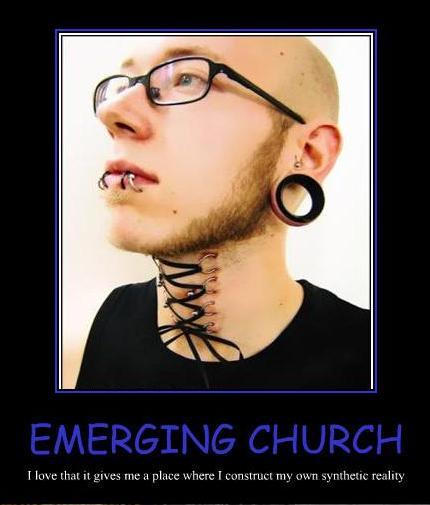Over at The Atlantic, Josh Kron writes about an evangelical group, the Emerging Church, which is influential in Africa and whose leading members are behind Invisible Children and Kony 2012. Kony’s creator, Jason Russell, was earlier in the good news for his viral video and later in the bad news for what appears to be a naked bi-polar breakdown on a San Diego street corner.
For reasons that Kron makes apparent, it’s difficult to get a fix on the Emerging Church:
At the heart of the movement is the growing perception that mainstream, organized Christianity is not only fundamentally flawed, with its dictates and rigid doctrines and inherently negative and insecure worldview, as many Emerging Church adherents see it, but that it follows a false gospel. Some wouldn’t mind seeing the Vatican collapse.
The Emerging Church preaches, in its uniquely deconstructionist way, what it claims is Jesus Christ’s original, true message, seemingly lost long ago: that God lives in each person, that the Kingdom of Heaven is here on Earth now, and that faith is not belief but an action and spiritual state of being to be experienced creatively, through human relationships, and by raising questions.
“There are a lot of us who would agree that we need to re-focus on Jesus’s core message, which is very, very different from what a lot of Christians have focused on,” Brian McLaren told me in a recent interview. Members of the movement don’t necessarily seek the answer to life’s questions or even believe those answers necessarily exist. “It has a lot more to do with what is God’s will for the planet, and how do we human beings start cooperating and addressing each other.”
Not everyone has been receptive. “There is an alarming trend in Christianity today,” warns an anchor on a Christian YouTube channel, that is “finding its way into many churches and Christian colleges.”
“They have erased the boundaries!” exclaims Pastor Bob DeWaay on the show. “You imagine God how you want to imagine God, you imagine the future how you want to imagine the future.” He warns, “Dear ones, don’t be deceived by these people!”
It’s good to see an agent of institutional religion recognize that what is at stake here are boundaries. As Emerging Churchers may or may not know, it sounds like they are revisiting some old gnostic territory. While Kron and others are calling this “liberal” Christianity, I don’t think this is right term. While “liberal” is so elastic as to be nearly meaningless, when it attaches to Christianity I think ecumenical and progressive, the kind of “can’t we all just get along and vote Democratic for a better world” stuff found at Fluff Po Religion.
It’s evident that for Emerging Churchers, praxis takes precedence over belief and ontology is more important than eschatology. Although tech-savvy Emerging Churchers aren’t isolated in mysticism, the proper term might be “neo-gnostic.”

It will be interesting to watch as organized religion polices old boundaries and the Emerging Church defines itself in opposition, a dialectical process which inevitably results in different discourses and new boundaries. Sooner or later the Emerging Church will be labeled, essentialized, and slotted. This is how those with an interest in marginalizing others do their dirty word work. Already the process has begun; this pastor suggests that the Emerging Church is a “cult.”

